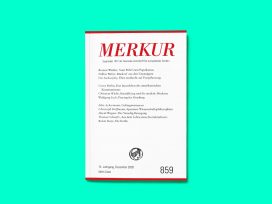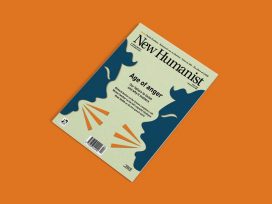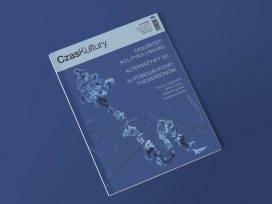
Aleatory democracy
Merkur 12/2020
In ‘Merkur’, the return of the rabble: why populism is all about undesirable feedback – and how to break the loop. Also: New Right politics of history in the recent Hohenzollern restitution controversy.

In ‘Merkur’, the return of the rabble: why populism is all about undesirable feedback – and how to break the loop. Also: New Right politics of history in the recent Hohenzollern restitution controversy.

In ‘Wespennest’: how Austria’s historically multilingual literature has been complemented by a range of idioms from beyond the former Empire; and why Europeans should reclaim English as the Franco-Germanic hybrid that it is.

Responding to the Islamist terror in France and Austria, Blätter publishes contributions calling for a more critical approach to Islamism on the left: why secular Islam must wrest back cultural hegemony from militants in order to avoid complicity; and how left apologetics are rooted in delusions about an anti-capitalist alliance with fundamentalists.

‘New Humanist’ explores political polarization, including the moral panic about free speech on university campuses; the asymmetric hostility between left and right; and the mainstreaming of QAnon.

Urbanist magazine ‘dérive’ on emancipating Brazilian museology; the potential for Polish cultural centres; Swiss commons as a transferable prototype; and post-explosion Beirut.

Understanding values in uncertain times: ‘New Eastern Europe’ on what has happened to Ukraine’s pro-western alliance; how female soft-power has moved centre-stage in Belarus; and why most Hungarians still support a neoliberal xenophobe.

Public Seminar blames the disappearance of local journalism for the over-dependency on polls. Also: why anti-racist literature may not signal a new conversation about race; and how schools remain arenas of exclusion in secular France.

‘Czas Kultury’ explores new cultural narratives that test established social, political and economic mindsets: degrowth – the antithesis to post-communist consumption – meets end of the world stories infused with western values and conspiracy theories based on political collusion.

‘Vagant’ heralds writing that moves staid positions on the welfare state: freelance writer Henning Hagerup exposes Norway’s bureaucratic system; Christian Johannes Idskov notes the literary excellence and fated criminality of second-generation migrant Hassan; and Joni Hyvönen asks, Ken Loach: tragedian or saboteur?

Is it accurate historically to apply the term ‘fascism’ to America under Trump? And is to do so strategically astute? A special issue of ‘Public Seminar’ weighs in on the debate over the f-word. With contributions from Jan-Werner Müller, David Bell, Natasha Lennard and more.

‘Letras Libres’ says that a Trump victory would reinforce hostilities between the US and its southern neighbours. Why Mexico in particular must recognize that Trump has been bad for the country. With contributions from Alfredo Corchado, León Krauze, Dan Restrepo and more.

‘Rīgas Laiks’ feels better about ageing after talking to an Amazonian chief. But alterity can be found much closer to home too: an interview with a villager from eastern Latvia offers a lesson in rustic self-expression. Also: Belarusian women on the frontline.

Slow, indecisive, vulnerable to manipulation: the charges against democracy are familiar. But as contributions to ‘Esprit’ argue, what makes democracy fragile also makes it strong. Including Michaël Fœssel on democracy’s relation to time, and Axel Honneth on the new spirit of participation.

Czech journal ‘Revolver Revue’ finds a refreshing lack of animosity in the posthumously published memoirs of the dissident Olga Stankovičová. Also: Socialism or Communism – why contemporary historians are getting their terminology wrong.

French journal ‘Revue Projet’ warns against the old assumption that representation must be democratic and argues that the electoral system must be de-privatized. Also: revisiting Bruno Latour’s ‘parliament of things’ – can natural objects be given legal and political representation?

‘Ord&Bild’ explains how Sylvia Plath belatedly came to influence Swedish literary tastes; why William Morris was a forerunner of fantasy fiction; what Richard Sennett gets wrong about cities; and why, after Alexievich, text is held to higher standards of documentary truth than film.